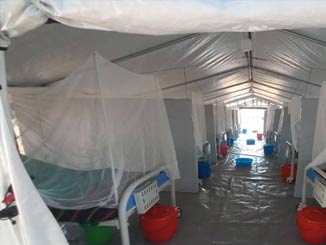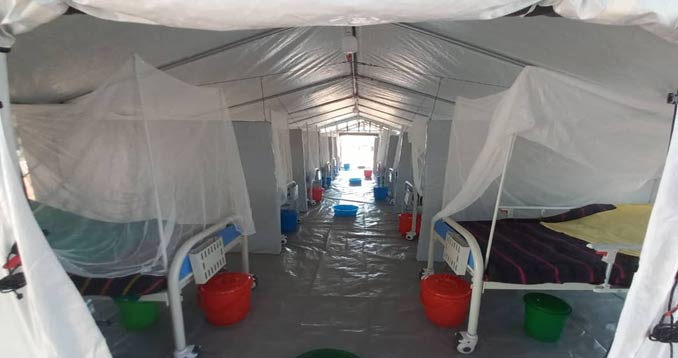

Doctors Without Borders/Médecins Sans Frontières (MSF) teams are working with the Ugandan Ministry of Health (MoH) to respond to an Ebola outbreak in the country. As of Oct. 9, the MoH has confirmed 48 cases of Ebola and reported 17 confirmed deaths from the disease and 20 probable ones. As of Oct. 4, MSF has set up a 36-bed Ebola treatment unit at the Mubende hospital, with intensive care capacity for suspected and confirmed patients. We are also working to set up smaller centres in affected sub-districts like Madudu (the epicentre of the outbreak, located 20 kilometres from the district capital Mubende).
The day after the outbreak was declared on Sept. 20, an MSF emergency team of six staff travelled to the town of Mubende to carry out an initial assessment at the hospital where the first case was detected.
Ebola is a serious and often deadly viral disease with a mortality rate of up to 90 per cent. Initial symptoms are similar to those of many other illnesses: a sudden onset of fever, fatigue, headache and sore throat. This can be followed by vomiting, kidney and liver failure, a rash and in some cases external or internal bleeding.
MSF has responded to various Ebola outbreaks over the past decade, including in West Africa from 2014 to 16 and in Democratic Republic of Congo from 2018 to 20. These epidemics were caused by the Zaire strain of the virus and were followed by scientific advances, including the approval of two vaccines and an antibody treatment.
One of these vaccines was developed in Canada by scientists at the National Microbiology Lab in Winnipeg. While that vaccine has saved lives, it could have been ready sooner and protected even more people. Greater impact on more lives would be possible if Canada had a more effective pathway to get useful innovations from the lab to patients who need them, rather than the current system of depending upon commercial pharmaceutical companies who prioritize profits over public health.
But there are currently no vaccines or specific treatments for the Sudan strain, which is responsible for the outbreak in Uganda. Without these tools, treatment involves managing symptoms of the disease and providing intensive care when needed to improve patients’ chances of survival. Here, history is repeating itself; that same Canadian laboratory has had a potential vaccine for the Sudan strain for well over a decade but finishing its development has not been a priority. The same is true for other serious diseases MSF encounters, such as Marburg and Lassa Fever, which also still lack vaccines.
“We know that the earlier patients receive medical attention, the greater the chance of survival,” says Dr. Guyguy Managama, MSF deputy head of emergency programs. “As the initial symptoms of Ebola are not distinctive, the main issue is rapid access to information, diagnosis and care.”
It’s critical the emergency response takes place close to affected communities. In past outbreaks, patients were often taken straight to large case-management centres outside their communities, which in many instances led to negative rumours circulating within the community, hostility towards health workers and the rejection of the response.

Leave a Reply